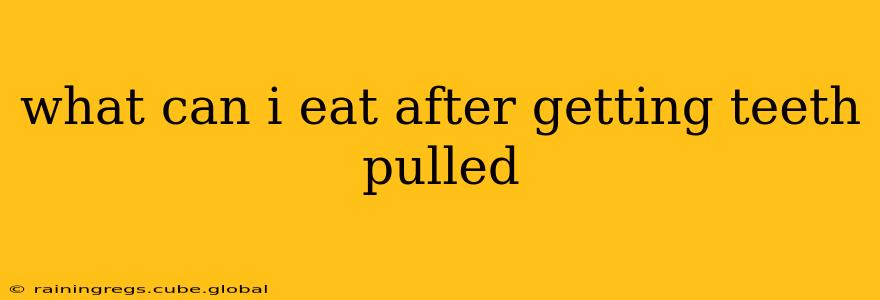What Can I Eat After Getting Teeth Pulled? A Guide to Post-Extraction Diet
Having teeth pulled can be a bit of a rough experience, and knowing what to eat afterward is crucial for a smooth recovery. This guide will walk you through the best foods to consume post-extraction, focusing on soft, nutritious options that won't disturb the healing process. We'll also address common questions surrounding post-extraction diets.
What are the best foods to eat after tooth extraction?
The key is to focus on soft foods that are easy to chew and swallow and won't irritate the extraction site. Here are some excellent options:
-
Smoothies: Packed with nutrients and easy on the gums. Blend fruits, vegetables, yogurt, and even protein powder for a complete meal replacement. Avoid using a straw, as the suction can dislodge blood clots.
-
Yogurt: A great source of protein and probiotics, beneficial for overall health and gut flora. Opt for plain yogurt and add your own fruit for sweetness.
-
Applesauce: A classic post-extraction food. It's soft, easy to swallow, and provides some natural sweetness.
-
Mashed Potatoes: Creamy, comforting, and packed with carbohydrates for energy.
-
Oatmeal: A warm, soothing option, particularly beneficial for breakfast. Stick to plain oatmeal and add a touch of honey or fruit for flavor.
-
Scrambled Eggs: A good source of protein, scrambled eggs are easy to chew and digest.
-
Pudding: A sweet treat that's gentle on your gums. Opt for options without nuts or seeds.
-
Soups (broth-based): Nutrient-rich and easy to consume. Avoid soups with chunks of vegetables or meat that require excessive chewing.
Foods to Avoid After Tooth Extraction
It's equally important to know what to avoid. These foods can dislodge blood clots, hinder healing, or irritate the extraction site:
-
Anything requiring excessive chewing: Avoid hard, crunchy, or chewy foods like chips, nuts, crackers, and raw vegetables.
-
Spicy foods: These can irritate the sensitive extraction site and cause discomfort.
-
Hot foods: Heat can increase inflammation and bleeding.
-
Foods with small seeds or hard pieces: These can easily get lodged in the extraction site.
-
Alcohol and tobacco: These impede the healing process and increase the risk of infection.
What if I'm still hungry after eating these foods?
If you're feeling hungry after consuming soft foods, don't worry, you can always supplement with nutrient-rich drinks like protein shakes or smoothies to maintain your energy levels while adhering to a gentle diet.
How long should I eat a soft food diet after a tooth extraction?
The recommended duration of a soft food diet after tooth extraction varies based on the complexity of the procedure and individual healing. Your dentist will provide you with specific instructions. Generally, you can expect to gradually reintroduce firmer foods after a few days to a week.
What if I experience dry socket?
Dry socket is a painful complication that can occur after tooth extraction. If you experience severe pain, a bad taste, or visible bone in the socket, contact your dentist immediately. They will be able to provide the appropriate treatment to alleviate discomfort and promote healing.
Can I eat solid foods right away after the surgery?
No, it's crucial to avoid solid foods immediately following tooth extraction to allow the blood clot to form properly and prevent complications like dry socket. Following your dentist's instructions regarding post-operative care is essential for a successful recovery.
Remember, patience and careful attention to your diet are key factors in ensuring a smooth recovery after a tooth extraction. If you have any concerns, always consult your dentist or oral surgeon. They can offer personalized dietary advice and address any specific questions you may have.
